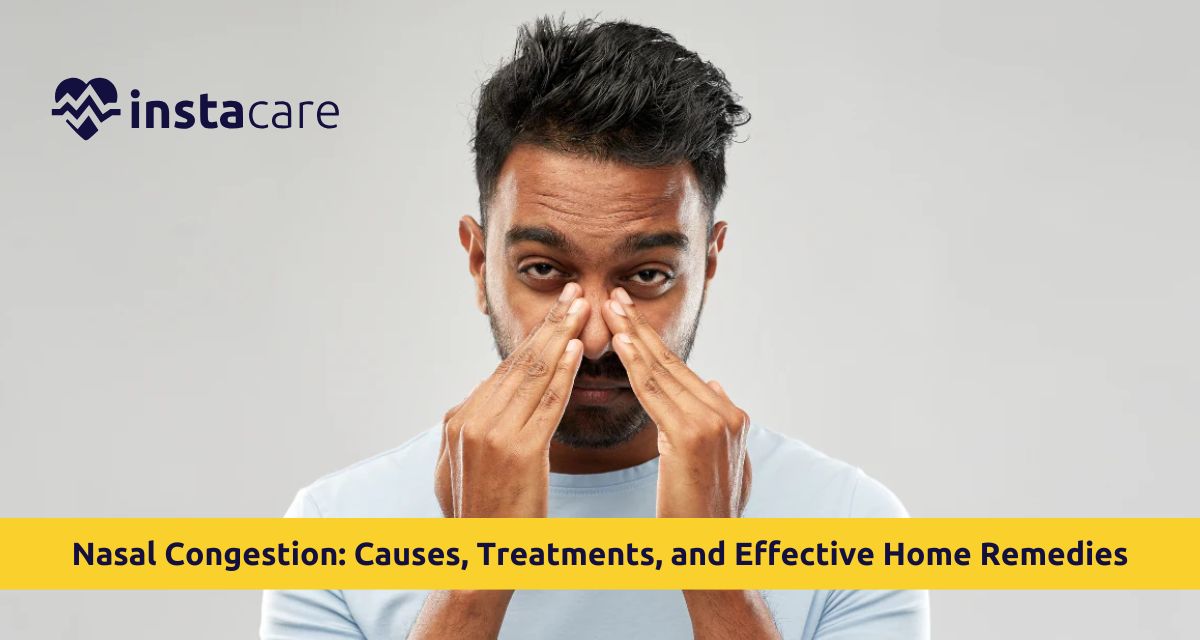Blocked nose, stuffy nose, or congested nose: nasal congestion is the normal state resulting from inflammation of nasal passages. Cold, allergy, or sinus infection are among the likely reasons for nasal congestion, and these are possible for any age group even for newborn babies.
In addition to the fact that nasal congestion is temporary, nasal congestion also has implications of insomnia, headache, and quality of life. Stuffy nose relief and preventive advice are therefore introduced here in this article due to nasal congestion, home care, and medical advice. Obstruction or nocturnal nasal congestion, no matter the cause, know what you can do under proper regulation.
What Is Nasal Congestion
Congestion of the nose refers to partial or complete blockage of nasal passages, often resulting from inflamed blood vessels of sinuses. Inflammation of nasal passages' linings causes swelling and mucus production resulting in painful breathing through the nose.
Painful signs include:
- Stuffiness or discharge in the nose
- Headache or pain in the cheek
- Sneezing and coughing
- Postnasal drip
- Snoring or insomnia
Nose congestion in the vast majority will resolve on its own. Nasal congestion that lasts longer than 10 days or is a chronic symptom may be a sign of an underlying medical condition that should be evaluated with the help of a physician, though.
Causes of Nasal Congestion
Determination of the causes of nasal congestion will lead to proper treatment. Among the most common culprits are the following:
Common Cold or Flu
Infection by virus causes inflammation of the nasal passage and mucus secretion. Sinuses' daily causes of congestion.
Allergic Rhinitis
Allergic rhinitis is also referred to as hay fever, caused by allergens such as pollen, dust, or dander of domesticated animals. Causes sneezing, runny nose, and nasal passage obstruction, most common during peak allergy season.
Sinusitis (Sinus Infection)
If sinuses become infected or inflamed, there will be facial pressure, congestion, and pain. Either chronic or acute sinusitis will ensue.
Nasal Polyps
They are nasal mucous polyps that are benign in nature which will bring about obstructions and ongoing nasal stuffiness.
Deviated Septum
Deviated nasal septum will make one or both nostrils narrower, and this leads to an attack of stertorous breathing and nasal congestion at night.
Environmental Irritants
Smoking, bad odors, and exposure to outdoor air pollution are all annoying to nasal membranes and can cause swelling and mucous production.
Medication
Recreational use of decongestant sprays such as oxymetazoline leads to rebound congestion when stopped at the end of treatment with the nose even more stuffed up.
Hormonal Changes
Menstruation, pregnancy, and thyroid disease lead to hormonal changes that produce swelling and nasal congestion.
Nasal Congestion in Infants
Congestion to infants can be brought about by the fact that their nasal passages are narrower. They get clogged by the cold airway, and particularly when they sleep or feed.
Medical Treatment of Nasal Congestion
Irrespective of whether your case is acute or chronic, nasal congestion treatment is required medically. Some of the below are options:
Nasal Decongestant Sprays
Sprays that constrict dilated nasal blood vessels relieve at once. They should not be used longer than three consecutive days due to rebound congestion.
Oral Decongestants
Drugs like pseudoephedrine relieve nasal stuffiness but have side effects of increased rate of heart beating, restlessness, or insomnia.
Antihistamines
Antihistamines like loratadine or cetirizine suppress allergy-caused congestion symptoms very effectively.
Steroid Nasal Sprays
Anti-inflammatory sprays (e.g., fluticasone) that reduce chronic nasal congestion and nasal inflammation.
Saline Nasal Sprays and Rinses
Over-the-counter medication that blows out the allergens and disperses mucus. Saline irrigations are safe and effective in children and adults.
Allergy Shots (Immunotherapy)
They are used for long-term management of victims of severe allergy. They desensitize your immune system gradually to certain allergens.
Surgery
In case the root of the condition is deviated septum, nasal polyps, or chronic sinusitis, then surgery is necessary for long-term treatment.
Some Home Remedies That Actually Work for Nasal Congestion
Light to moderate nasal congestion is easily treated at home with some fast but effective remedies for nasal congestion:
Steam Inhalation
Steaming water thins out mucus and constricts swollen nasal passages. eucalyptus or peppermint oil added is an added advantage.
Warm Compress
Warm washcloth over the face eases congestion and pressure in sinuses by dilating the blood vessels.
Drink Plenty of Fluid
Have sufficient fluid in your body so mucus thins and drains out of your sinuses.
Humidifier
Placing moisture into the air using a humidifier makes the air more humid, and this can reduce burning nasal passages and protect against dryness-caused congestion.
Chili Peppers
Eat chili peppers or horseradish so that the nasal passage stays open for some time by releasing mucus.
Sleep on Head Higher
Sleeping higher by lying on an extra pillow to elevate your head can ease nighttime congestion in your nose and minimize snoring due to the narrowed airway.
Neti Pot
Neti pot cleans the nasal passage. Use a saline solution and sterilized water or distilled water to avoid infection.
Essential Oils
Eucalyptus oil and tea tree oil are anti-inflammatory. You can diffuse and inhale them to heal.
How to Prevent Nasal Congestion?
Can't always, but can make it less likely with prevention techniques:
- Don't come into contact with recognized allergens such as dust mites, pet dander, or pollen
- Utilizing an air cleaner to control indoor air pollutants
- Hand washing as a hygiene practice to avoid infection from viruses
- Watering down with water
- Prevention of smoke and secondhand smoke
- Intermittent spraying of one's nose to avoid dependence or rebound
- Antihistamines or allergy injections as clinically indicated for allergy reaction
In infants, nasal passages need to be syringed daily with a bulb syringe and there needs to be a humidifier in the bedroom in order to have babies nasally clear.
Conclusion
Nasal congestion is annoying in the long run as it may be a long-term disease that may disrupt sleeping and overall health. Ranging from hay fever and viral infection to such diseases as a deviated septum, nasal congestion has numerous causes. Thankfully, there are home remedies for nasal congestion ranging from medications such as nasal decongestant spray, antihistamines, to surgery.
Most over-the-counter drugs for nasal congestion such as inhaling steam, saline rinse, and humidifiers can be a huge relief as well. Your physician can determine why your congestion is happening. If it lasts longer than 10 days or gets worse, particularly with fever and facial pain, see your doctor. Proper prevention, early care, and lifestyle will have clear breathing and wide-opened nasal passages.
Please book an appointment with the
Best ENT Specialist in Lahore, Karachi, Islamabad, and all major cities of Pakistan through
InstaCare, or call our helpline at 03171777509 to find a verified doctor for your disease.










